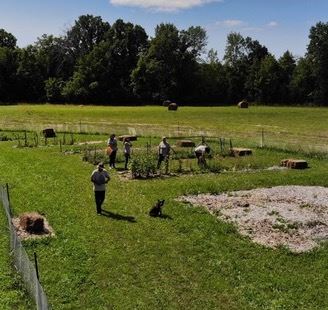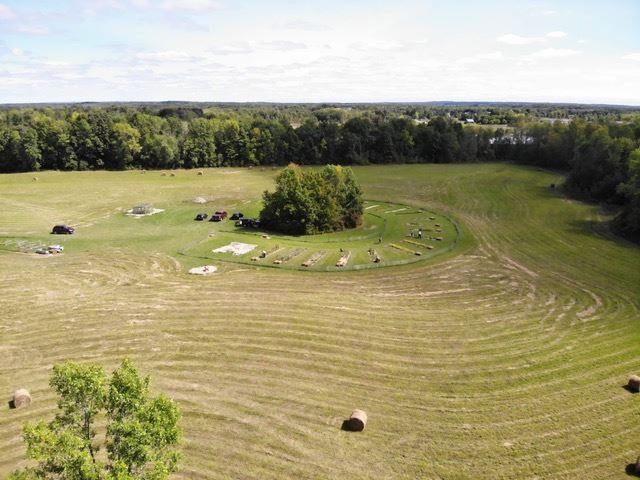- Home
- SOUL Members
- Member Profiles
- Cate Henderson
.JPG)
Cate Henderson Certified Organic Land Care Professional Advisor, Kenhteke Seed Sanctuary and Learning Centre Near Kingston, ON |
1. How did you become interested in gardening?
I grew up on a beef farm where we had a huge veggie garden and my Mum grew many ornamental gardens-she is still a very skilled gardener today! Vegetable gardening was my first love and continues to be my bread and butter, although I definitely dabble in ornamental edibles-including breeding vegetables to be more beautiful visually and growing flowering crops that are edible to humans and pollinators. I went to university to study international development and ended up working on a community agro-forestry project in Ecuador. I knew I had to come back home and use gardening as community development here, so I returned and studied Horticulture at the U of Guelph.
2. What drew you to study and practice organic land care?
I grew up on a conventional farm, where we dusted the potatoes with poison and sprayed the cattle with insecticides to keep flies off them. I knew at a young age that I was uncomfortable with these ideas, and started handpicking the potato bugs instead of dusting them! I figured my ancestors managed to feed themselves without relying on smelly, expensive chemicals from the store, so I should be able to as well (can you tell I’m a bit stubborn?). Over the years, my convictions have often enough been proven correct, and now even conventional farmers are planting cover crops and practicing no-till, and even conventional horticulture no longer uses certain chemicals. And of course the whole lawn care market has completely shifted partly due to regulation.
3. What are some of the challenges, limitations or opportunities you've encountered practising environmentally-friendly gardening?
The main challenge seems to be peoples perception of what is attractive in a landscape. It seems the Horticulture industry, and I include here the Horticulture Societies and garden clubs, has spent many decades convincing people that controlled sterility is attractive in a garden, and that perception still rears its head in my own mind and in opinions I hear voiced in my work. It doesn’t take much for people to realize that there is beauty in health and vitality and then to see the difference, but it remains a challenge to remind myself and others of this. Another limitation would be site-related, in that we do sometimes have to say “ok, this site is just not appropriate for the purpose I would like it to have. I will have to fulfill that purpose elsewhere, or modify my desires!” Sometimes this limitation is disappointing, but sometimes it is fun to work with, to explore other options, come up with ideas and work-arounds. Often it becomes an opportunity for creativity!
4. In the past few years, have you noticed a shift in people's interest in incorporating land care practices that have a lower environmental impact than conventional practices? If so, what do you think is driving this interest?
I would say I noticed a shift in the early 2000s with the adoption of “natural lawn care”, pollinator gardens and use of mulches. But lately there seems to be some stagnation, in that clearly lawn mowers, leaf blowers and other yard-related small engines are bad for the environment and are a cause of climate change, but there seems little discussion about it or adoption of alternatives. People talk a lot about driving less or using electric vehicles these days, but small engines are exponentially worse emitters and people are still mowing their lawns as usual. Urban yards have a ton of potential to absorb carbon and increase organic matter, thereby absorbing more during rain events to reduce flooding, etc. But people (and businesses) don’t seem to be ready to make use of that potential. I made a deposition to our City recently on these issues-at their request to see what options were available vis Climate Change-and I have heard nothing from them since. But I just haven’t found that “driver” of interest yet-I’m sure it’s coming!
5. Can you describe a project you've worked on that has inspired you or increased your knowledge or awareness about land care?
I currently work on a project called the Kenhteke Seed Sanctuary and Learning Centre, which is centred around the “Rematriation” of an heirloom seed collection to Tyendinaga Mohawk Territory-a Haudenosaunee community near Prince Edward County. Located on remarkably good agricultural land (most First Nations were relocated off good agricultural land to make room for settler farmers), the Kenhteke Seed Sanctuary is now caring for 15 acres of community (ie reservation) land and growing almost 300 varieties of vegetables, in rotation, for seed (food is a happy by-product). Some of the varieties are traditional Haudensaunee crops and some originate elsewhere, but are commonly eaten as food nowadays in this community (eg. Kale). There is a very important world-view in play in this project, in that all the plants, insects, animals, earth, etc are viewed as “our relations”-they are not “things” that we manipulate to our advantage, but actors in caring for each other. We humans have to bring our “Good Minds” to work with us, to respect and work as equals with the other beings around us. This is very much the sense I had as a child when I decided not to use the chemicals any more-I felt using the chemicals did not respect all the beings involved in making our garden successful somehow, and so I wished to find another way that seemed more kind and respectful! So I feel right at home and I am learning a lot about the potential for care of the land and each other as I work with this community of dedicated folks. https://kenhtekeseedsanctuary.com/
6. Finally, what effect does spending time in gardens or greenspace have on you personally?
It is good to work in a garden-you see some results immediately, and other results you know you will see in time. You are physically tired by the end, so you sleep well and wake up rested. You are also intellectually challenged to make informed decisions under a variety of conditions, not always knowing what tomorrow will bring but doing your best to prepare for it anyway. You are humbled often-so much is out of your control, and you get to see other living beings doing some amazing things-building their homes, finding their food, etc. I grow vegetables mainly, so when I end up snacking in the garden I know I’m eating very healthy food myself. I find it easy to be peaceful in gardens and greenspace, and in a fast-paced, anxious world, this peace is a treasure, although of course I won’t give up my mediation time!
 |
Drone photos of Kenhteke Seed Sanctuary. Credit: Steve Mongeau |

